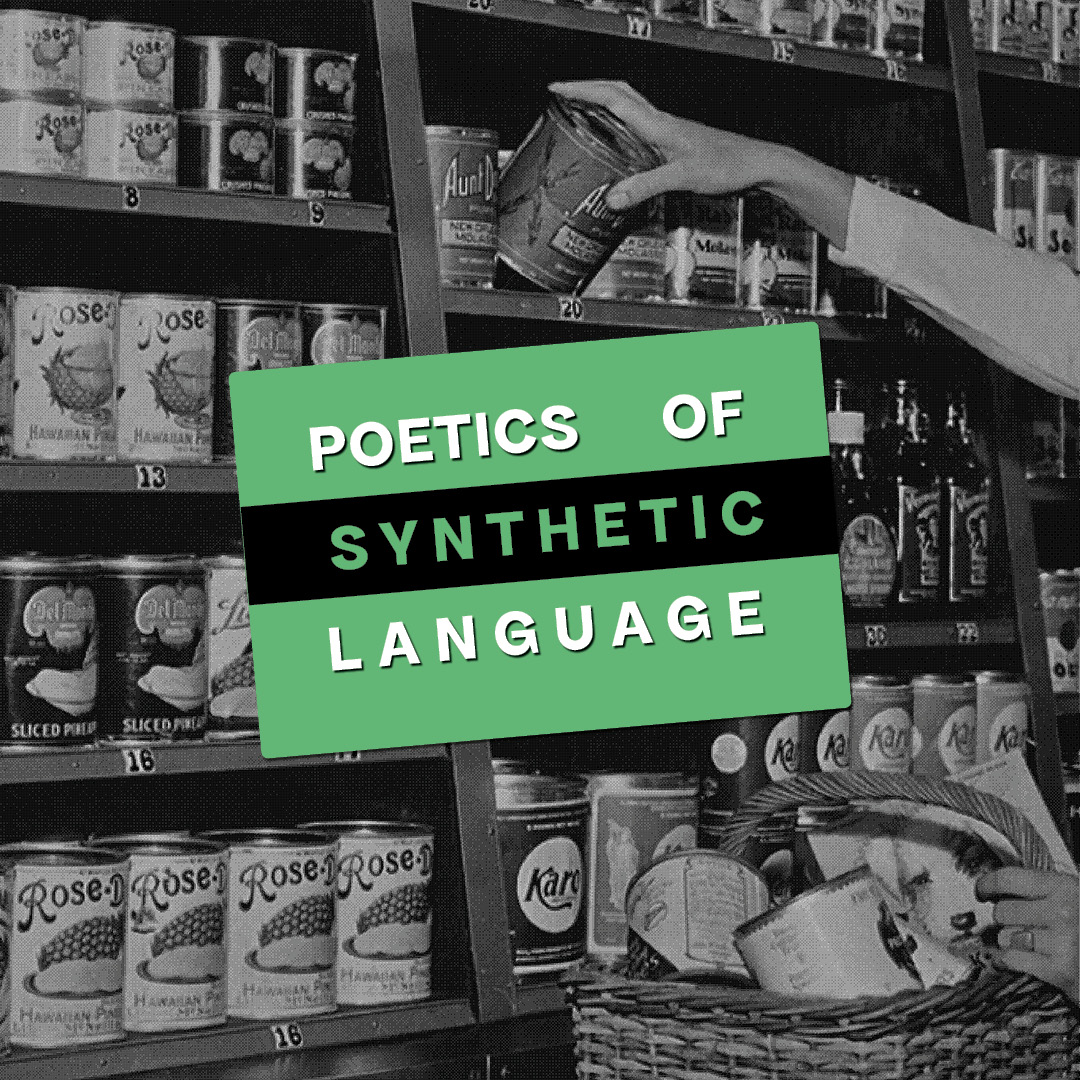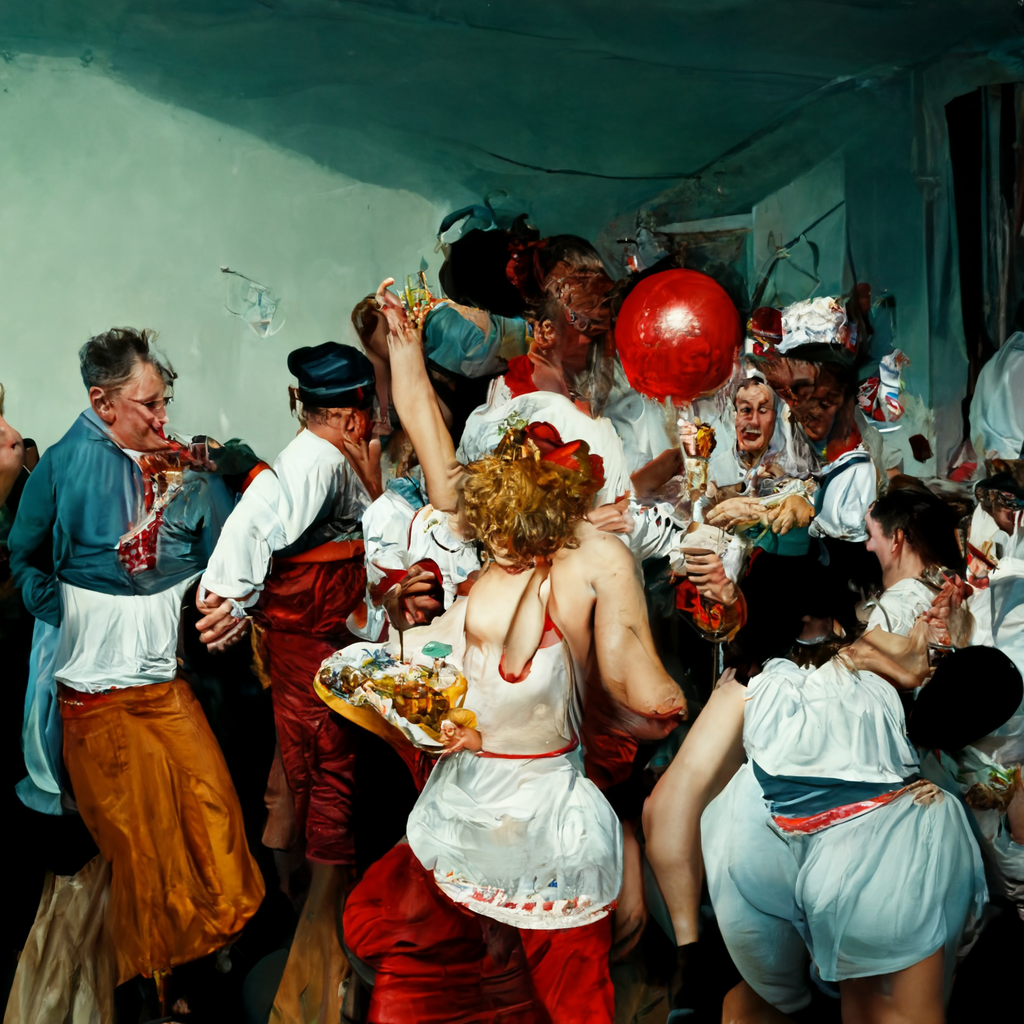Poetics of Synthetic Language
Overview
Poetics of Synthetic Language is a multi-month research residency for cultural producers exploring the poetics of large language models and synthetic language generally. What happens to the poetics of a work when language is being drawn not from engagement with the world but rather from a large language model trained on a vast corpus of human language? What are the risks and opportunities of relying on synthetic language that is not participating in the continuous process of becoming and evolving that defines language running wild in the world?
Stratification and diversity of speech will spread wider and penetrate to ever deeper levels so long as a language is alive and still in the process of becoming.
Large language models (LLMs) are a type of artificial intelligence (AI) technology that use advanced machine learning algorithms to process and generate language that appears natural.
The explosive growth in LLMs suggests a future where this synthetic language can be accessed as easily as running water or bananas from the tropics.
Of course, vast socio-technical structures underpin these systems. Water from a tap or bananas on a shelf only tell part of the story.
Love letters, novels, poems, epics, satire, and other forms draw on a shared reservoir of culture and language but are organized in different ways based on the fundamental structures appropriate to their genre. Creators of prose art draw on the language(s) around them and give them a shape and a unity of intention.
What happens to the poetics of a work when language is being drawn not from engagement with the world but rather from a large language model trained on a vast corpus of human language? What are the risks and opportunities of relying on synthetic language that is not participating in the continuous process of becoming and evolving that defines language running wild in the world?
Much of the debate around LLMs has centered on the processes by which these models are trained and the relative quality of the outputs that they support. However, we must consider a future where the volume of synthetic language produced by machines will quickly outstrip that produced by human beings. What happens when water is only available from a tap or in a bottle? What happens when the fruits available to us are limited to only those easily delivered to a supermarket?
Verbal art must now contend with the introduction of an intermediary, akin to a chisel for a sculptor or a cello for a musician. What does this intermediary allow? What does it restrict?
Poetics generally refers to how a work of prose art is constructed. While hermeneutics explores what a text “means”, poetics is concerned with the various elements that give a work shape.
There are a range of schools of thought on how best to structure this inquiry. Some, such as the structuralists, believe that poetics can be systematic and objective. Others, such as Mikhail Bakhtin, see poetics as involving the ever-evolving processes of becoming, defined by polyphony and multiple consciousness brought into relationship with one another in service to authorial intentions.
The arrival of large language models presents both challenges and opportunities for those exploring the art of the written word and this residency is intended to invite conversation and generate outputs to explore a rapidly changing world.
We are curious about the degree to which an automated system allows for other values to be expressed, to detach from constraining contexts, or to open up connotations.
Do large language models arrest the perpetual becoming of language or introduce a new space for genres and forms to emerge?
What to Expect?
Participants will move through three phases in this residency.
Phase I: Collaborative Architecture (March 2023)
At first, working with Hypha Workers Cooperative and the Laboratory for Artistic Intelligence, residents will develop a collaborative architecture to structure interactions.
Participants will be guided through a process to determine the appropriate infrastructure within which they will interact.
The default is often corporate platforms that offer high comfort, security from external threats, and ease of use. However, these platforms and their design are driven by their owners’ interests which shapes both how they are used and what happens to the data generated through the process.
find out more about our infrastructure work with Hypha Worker Cooperative and the Laboratory for Artistic Intelligence
Benjamin Bratton offers that “platforms are formally neutral, but remain, each and every one, uniquely ‘ideological’ in how they realize particular strategies for organizing their publics”. The ideological and the aesthetic are hopelessly entangled and we are inviting residents to make deliberate choices about the material and relational poetics of their interactions.
To imagine the poetics of synthetic language, we will linger on the too-often opaque nature of the tools we use to generate and communicate that language. What are the consequences of our choices? How are these choices complicit in co-producing our social, cultural, and political lives? How might this infrastructure be imagined, represented, and narrativized?
There will be some element of ‘work’ to sorting through the choices available and some ‘labour’ in setting up systems that have not been optimized in service to others’ ends.
Potential questions to consider:
- What are the ecological consequences of our desired infrastructure?
- What trade-offs are we willing to make among safety, privacy, and stability?
- What is the relationship between how our infrastructure is represented or materialized and the work we hope to do?
- How does our work intersect with the moral positions dominant in most platforms (generally efficiency and growth)?
Phase II: Virtual Residency (April to August 2023)
Residents will interact synchronously and asynchronously over five months. Guests will offer contributions and talks to support the interests of the participants. Mentors will provide ongoing support drawing on trends in industry, academia, design, and in the broader culture.
While we encourage collaboration and creation, there is no obligation to generate outputs. Artist and designer Mida Fiore will accompany the process to ensure that paths are documented and shared at the conclusion of the program.
Phase III: In-Person Residency (September 2023)
Residents will spend a week in Milan, Italy further developing ideas developed in Phase II as part of an intensive cohort. Site visits, particularly within publishing and printing, will support residents to accelerate their ideas and transition them into potential projects following the residency’s completion.



